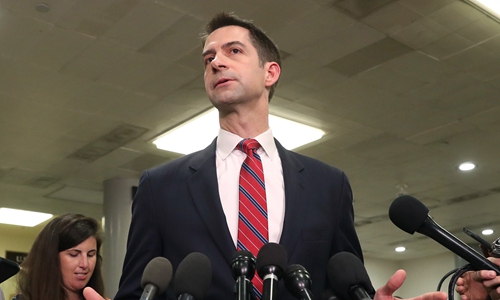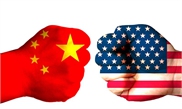
US Senator Tom Cotton speaks to the media after attending a briefing with administration officials about the situation with Iran on January 8 in Washington, DC. Photo: AFP
Republican Senator Tom Cotton of Arkansas has launched yet another ridiculous attack on China. He told Fox News that it was a "scandal" for the US to train Chinese students and see them "go back to China to compete for our jobs, to take our business, and ultimately to steal our property, and design weapons and other devices that can be used against the American people."He then had the temerity to suggest that Chinese students should not be permitted to study science and technology in the US, and should be forced to only take classes on Shakespeare and the Federalist Papers.
Cotton's contrarian comment requires one to suspend their understanding of hypocrisy. Here's a politician preaching unfounded concerns about academic freedom who then calls for restrictions on the subjects Chinese students are allowed to study. "Balderdash" is a word Shakespeare might use in retort.
Netizens around the globe have responded to Cotton's "suggestions" with ridicule. "Cotton obviously flunked English literature" (Shakespeare is British not American), was one scornful comment. "I doubt many of his constituents have read either" Shakespeare or the Federalist Papers, was another insight into American education.
Perhaps Chinese students with firsthand experience in the US education system have the right to judge. One wrote on social media, "What other subject does the US lead the world? Does Cotton want us to go to the US and study its 'rogue politics?'"
There are more than 360,000 Chinese students studying in the US, yet some US politicians actually think restrictions on Chinese students will somehow hinder China's progress.
Do they not realize that it is the US that benefits most from Chinese students who study science and technology? Many Chinese students remain in the US after graduation to work as highly skilled professionals, which the US desperately needs. Others start tech companies that contribute to US economic development and scientific advancement.
Politicians in the US are in a race to see whose anti-China rhetoric is tougher and more extreme. Instead of explaining the need for consensus and compromise for the betterment of all citizens, they cater to latent xenophobia to gain a short term political advantage. Against the backdrop of rising populism and the widening social and economic gap in the US, some voters blame their plight on a certain race or country, while US politicians take the easy route and support this unenlightened mindset and perpetuate their voters' misery.
Some US lawmakers, who like Cotton, graduated from a renowned university or served in the military are among the fiercest anti-China super hawks. Hyping an anti-China agenda serves the special interest groups that back them. They know that playing the "China card" distracts voters' focus from the real problems that should be discussed and debated during this election year.
China hawks Cotton and senators Josh Hawley and Macro Rubio, were born in the 1970s. They witnessed their country become the world's sole superpower in the post-Cold War era and are determined to keep it that way. While China's rise has never been about achieving hegemony, these neo-conservative politicians see its rise as a threat, and repeatedly reiterate the need for a China containment strategy, which best serves huge corporations that are part of the US industrial military complex.
There is a new McCarthyism in the US and one wonders if these hawks have no sense of decency. Even those who are mildly critical of China are attacked as "evil communists" and criticized for being soft on China. This allows the hawks go extreme and call for radical policies in an attempt to stymie China, which will only bring the already shaky China-US relationship to the edge of the cliff.
If divisions between China and the US continue to widen with no hope for a consensus, the existing international system can hardly be sustained. Two parallel systems may emerge, with China and Western countries developing their own, as systematic confrontations evolve into a new cold war, or even a hot war.
The author is an assistant research fellow at the China Institute of International Studies. opinion@globaltimes.com.cn



